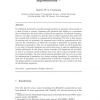Free Online Productivity Tools
i2Speak
i2Symbol
i2OCR
iTex2Img
iWeb2Print
iWeb2Shot
i2Type
iPdf2Split
iPdf2Merge
i2Bopomofo
i2Arabic
i2Style
i2Image
i2PDF
iLatex2Rtf
Sci2ools
JAPLL
2008
2008
A formal account of Socratic-style argumentation
In traditional mathematical models of argumentation an argument often consists of a chain of rules or reasons, beginning with premisses and leading to a conclusion that is endorsed by the party that put forward the argument. In informal reasoning, however, one often encounters a specific class of counterarguments that until now has received little attention in argumentation formalisms. The idea is that instead of starting with the premisses, the argument starts with the propositions put forward by the counterparty, of which the absurdity is illustrated by showing their (defeasible) consequences. This way of argumentation (which we call S-arguments) is very akin to Socratic dialogues and critical interviews; it also has applications in modern philosophy. In this paper, various examples of S-arguments are provided, as well as a treatment of the problems that occur when trying to formalize them in existing formalisms. We also provide general guidelines that can serve as a basis for imple...
Related Content
| Added | 12 Dec 2010 |
| Updated | 12 Dec 2010 |
| Type | Journal |
| Year | 2008 |
| Where | JAPLL |
| Authors | Martin Caminada |
Comments (0)

